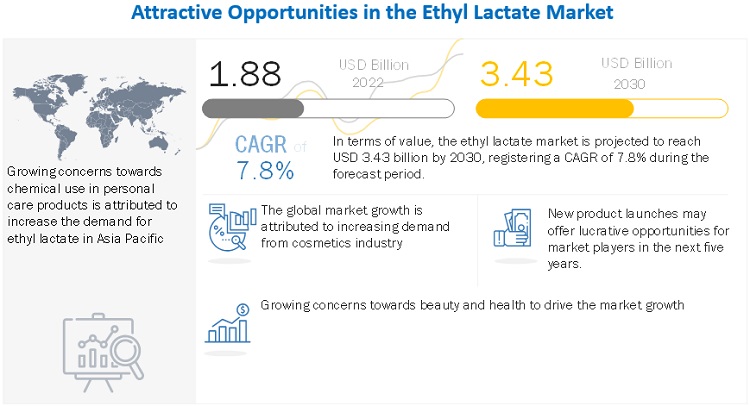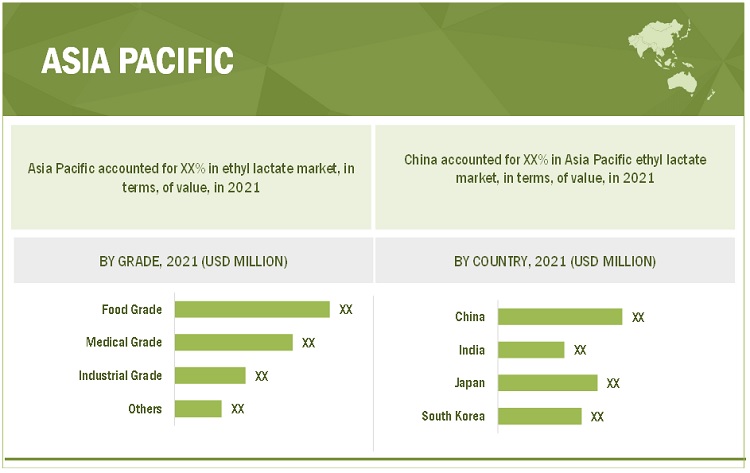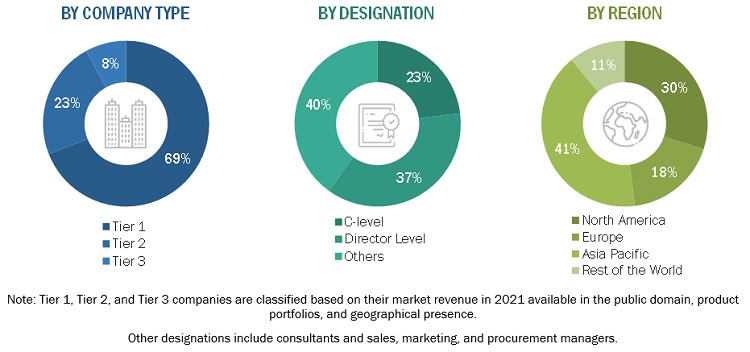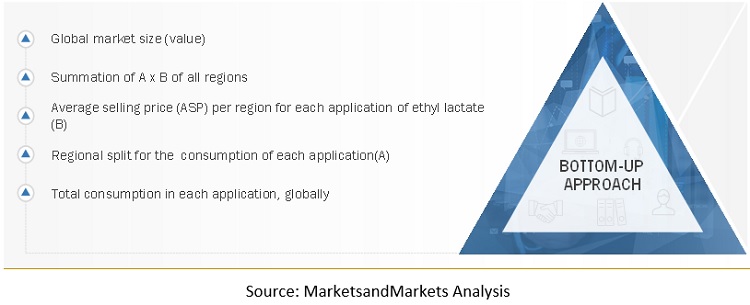Ethyl Lactate Market by Grade (Food Grade, Medical Grade, Industrial Grade), Application (Adhesives, Cleaners, Ink, Solvents), End-Use Industry (Paints and Coatings, Food and Beverages, Pharmaceutical and Healthcare, Personal Care and Cosmetics) and Region - Global Forecast to 2030
The ethyl lactate market is projected to reach USD 3.43 billion by 2030, at a CAGR of 7.8% from USD 1.88 billion in 2022. In the coming years, the demand for ethyl lactate will increase due to its non-toxic and non-carcinogenic qualities in the personal care, cosmetic, and food and beverage industries. Eco-friendly solvent ethanol lactate has potential applications in supercritical fluid technologies, including high-pressure chemical reactions, carbon dioxide co-solvent precipitation, and supercritical extraction procedures.

To know about the assumptions considered for the study, Request for Free Sample Report
Market Dynamics
Driver: Alternative to petroleum solvents
Ethyl lactate is now being utilized more frequently because to the increased need to create a cleaner environment and the tight rules being established. In many facets of the industry, substituting petrochemical solvents has proven to be more difficult. The petrochemicals sector is responsible for developing the majority of commonly used organic solvents. They are very toxic, corrosive, explosive, flammable, and explosive. Alternately, the fermentation of the carbohydrate feedstock results in the production of ethyl lactate, an ester of lactic acid. Since the solvent conveniently degrades to carbon dioxide and water, it is environmentally friendly.
Restraints: Harmful health impacts
When inhaled or absorbed via the skin, the colorless liquid ethyl lactate, which has a slight odor, can have an impact on the employees. Ethyl lactate can irritate the skin and eyes when in touch with them for a long time. According to the standardized classification and label (CLP00) established by the European Union, this material is a flammable liquid and vapor that causes significant eye injury and respiratory irritation.
Opportunities: Rising demand in cosmetics and personal care industry
Cosmetics and personal care items frequently include lactic acid esters like ethyl lactate. In addition to cosmetics, shampoos, hair dyes, colors, and other hair care products, these components are used to create moisturizers, cleaning solutions, and other skincare items. They are frequently present in cosmetics intended to improve the overall look and feel of the skin. The increased demand for organic components and the preference among consumers for organic personal care products are expected to drive market expansion over the next years.
Challenges: Volatility in raw material prices
Volatility in the prices of raw materials, such as crude oil and natural gas, over the past five years, has significantly impacted the ethyl lactate market. Therefore, manufacturers find it difficult to come with new and innovative products, which impact their operating profits. There are also cost pressures from customers, and the end-users have to adjust between the cost and performance tradeoffs, thereby affecting the performance of final products or their profit margin.
“Food grade was the largest grade for ethyl lactate market in 2021, in terms of value”
Ethyl lactate is a monobasic ester that is made up of ethanol and lactic acid and is used as a food additive. As a food additive, ethanol lactate, a monobasic ester composed of lactic acid and ethanol, is utilized. Food-grade ethyl lactate additives are crucial in the production of food and beverages because they improve the flavor and texture of food items in addition to stabilizing and extending their shelf life. The production of food and the use of green products with environmental-conscious production and disposal implications is becoming increasingly desirable.
“Solvents was the largest application for ethyl lactate market in 2021, in terms of value”
In 2021, the market for ethyl lactate was dominated by solvents. Solvents are necessary for the majority of chemical reactions in order to improve the interaction of the reagents and catalysts. The solvent also ensures a suitable technique for removing the products from the reaction mixture. Ethyl lactate, a bio-based solvent having the same potency as petroleum-based solvents, is also utilized in supercritical fluid technology as a co-solvent for carbon dioxide.
“Asia Pacific was the largest market for ethyl lactate in 2021, in terms of value.”
Asia Pacific region dominated the global ethyl lactate market, in terms of value, in 2021. In the upcoming years, it is anticipated that large markets like China, India, Japan, and South Korea would expand more. The expanding population and middle-class economy are linked to the robust and healthy growth in end-use sectors including food and beverage, medicines, and personal care, which tends to drive the ethyl lactate market.

To know about the assumptions considered for the study, download the pdf brochure
Key Market Players
The key players in this market Corbion (Netherlands), Galactic (US), Vertec Biosolvents (US), Musashino Chemical Laboratory (Japan), Godavari Biorefineries (India), and Henan Kangyuan (China). Continuous developments in the market—including new product launches, mergers & acquisitions, agreements, and expansions—are expected to help the market grow. Leading manufacturers of ethyl lactate market have opted for new product launches to sustain their market position.
Scope of the Report
|
Report Metric |
Details |
|
Years considered for the study |
2017-2030 |
|
Base Year |
2021 |
|
Forecast period |
2022–2030 |
|
Units considered |
Value (USD Million) |
|
Segments |
Grade, Application, End-Use Industry and Region |
|
Regions |
Asia Pacific, North America, Europe, Middle East & Africa, and South America |
|
Companies |
The key players in this market are Corbion (Netherlands), Galactic (US), Vertec Biosolvents (US), Musashino Chemical Laboratory (Japan), Godavari Biorefineries (India), and Henan Kangyuan (China). |
This report categorizes the global ethyl lactate market based on grade, application, end-use industry and region.
On the basis of grade, the ethyl lactate market has been segmented as follows:
- Food Grade
- Medical Grade
- Industrial Grade
- Others
On the basis of application, the ethyl lactate market has been segmented as follows:
- Adhesives
- Cleaners
- Inks
- Solvents
- Food Additives
- Fragrances
- Others
On the basis of end-use industry, the ethyl lactate market has been segmented as follows:
- Paints and Coatings
- Food and Beverages
- Pharmaceutical and Healthcare
- Personal care and Cosmetics
- Others
On the basis of region, the ethyl lactate market has been segmented as follows:
- Asia Pacific
- Europe
- North America
- Middle East & Africa
- South America
Frequently Asked Questions (FAQ):
What is the expected growth rate of ethyl lactate market?
The forecast period for ethyl lactate market in this study is 2022-2030. The ethyl lactate market is projected to grow at CAGR of 7.8%, in terms of value, during the forecast period.
Who are the major key players in ethyl lactate market?
Corbion (Netherlands), Galactic (US), Vertec Biosolvents (US), Musashino Chemical Laboratory (Japan), Godavari Biorefineries (India), and Henan Kangyuan (China).
What is the average selling price trend for ethyl lactate market?
Prices are low in Asian countries (primarily China and India) compared to those in Europe and North America due to the low prices of raw materials and the availability of low-cost workforces in Asia Pacific. .
To speak to our analyst for a discussion on the above findings, click Speak to Analyst

Table of content
1 Introduction
1.1 Objective of the study
1.2 Market definition
1.3 Market Scope
1.3.1 Years considered for the study
1.4 Currency
1.5 Unit Considered
1.6 Stakeholders
2 Research Methodology
2.1 Research Data
2.2 Secondary Data
2.2.1 Key data from secondary sources
2.3 Primary Data
2.3.1 Key data from primary sources
2.3.2 Breakdown of Primary Interviews
2.4 Market Size Estimation
2.4.1 Bottom-Up Approach
2.4.2 Top-Down Approach
2.5 Data Triangulation
2.6 Assumptions
2.7 Limitations
3 Executive Summary
4 Premium Insights
4.1 Opportunities in Ethyl Lactate Market
4.2 Ethyl Lactate Market, By Grade
4.3 Ethyl Lactate Market, By Application
4.4 Ethyl Lactate Market, By End-Use Industry
4.5 Ethyl Lactate Market, By Region
5 Market Overview and Industry Trends
5.1 Introduction
5.2 Market Dynamics
5.2.1 Drivers
5.2.2 Restraints
5.2.3 Opportunities
5.2.4 Challenges
5.3 Supply Chain Analysis
5.3.1 Raw Material Manufacturing
5.3.2 Manufacturers
5.3.3 Distribution
5.3.4 End-Use Industry
5.4 Porter’s Five Forces Analysis
5.4.1 Threat of New Entrants
5.4.2 Threat of Substitutes
5.4.3 Bargaining Power of Buyers
5.4.4 Bargaining Power of Suppliers
5.4.5 Intensity of Competitive Rivalry
5.5 Average Selling Price
5.6 Regulatory Landscape
5.7 Industry Outlook
6 Ethyl Lactate Market, By Grade
6.1 Introduction
6.2 Food Grade
6.3 Medical Grade
6.4 Industrial Grade
6.5 Others
7 Ethyl Lactate Market, By Application
7.1 Introduction
7.2 Adhesives
7.3 Cleaners
7.4 Inks
7.5 Solvents
7.6 Food Additives
7.7 Fragrances
7.8 Others
8 Ethyl Lactate Market, By End-Use Industry
8.1 Introduction
8.2 Paints and Coatings
8.3 Food and Beverages
8.4 Pharmaceutical and Healthcare
8.5 Personal care and Cosmetics
8.6 Others
9 Ethyl Lactate Market, By Region
9.1 Introduction
9.2 Asia Pacific
9.2.1 China
9.2.2 India
9.2.3 Japan
9.2.4 South Korea
9.2.5 Rest of Asia Pacific
9.3 North America
9.3.1 U.S.
9.3.2 Canada
9.3.3 Mexico
9.4 Europe
9.4.1 Germany
9.4.2 France
9.4.3 Italy
9.4.4 U.K.
9.4.5 Rest of Europe
9.5 Middle East & Africa
9.5.1 Egypt
9.5.2 Saudi Arabia
9.5.3 South Africa
9.5.4 Rest of Middle East & Africa
9.6 South America
9.6.1 Brazil
9.6.2 Argentina
9.6.3 Rest of South America
10 Competitive Landscape
10.1 Introduction
10.2 Market Share Analysis
10.3 Company Evaluation Quadrant
10.4 Competitive Situation & Trends
10.4.1 New Product Launches
10.4.2 Contracts & Agreements
10.4.3 Partnerships & Collaborations
10.4.4 Joint Ventures
10.4.5 Expansions
11 Company Profile
11.1 Corbion
11.1.1 Business Overview
11.1.2 Products Offered
11.1.3 Recent Development
11.1.4 MnM View
11.1.4.1 Key Strengths
11.1.4.2 Strategic choices made
11.1.4.3 Threat from competition
11.2 Galactic
11.3 Godavari Biorefineries
11.4 Musashino Chemical Laboratory
11.5 Vertec BioSolvents
11.6 Yancheng Hongtai Bioengineering
11.7 Huade Biological Ltd
11.8 Huan Kangyuan
11.9 Shenzhen Esun Industrial
11.10 Haijianuo Bioengineer
11.11 List of other key market players
12 Appendix
12.1 Insights from Industry Experts
12.2 Discussion Guide
12.3 Related Reports
The study involved four major activities to estimate the size of ethyl lactate market. Exhaustive secondary research was done to collect information on the market, the peer market, and the parent market. The next step was to validate these findings, assumptions, and sizing with industry experts across the value chain through primary research. Both top-down and bottom-up approaches were employed to estimate the complete market size. Thereafter, the market breakdown and data triangulation procedures were used to estimate the market size of the segments and subsegments.
Secondary Research
In the secondary research process, various secondary sources have been referred to for identifying and collecting information for this study. These secondary sources include annual reports, press releases, investor presentations of companies, white papers, certified publications, trade directories, certified publications, articles from recognized authors, gold standard and silver standard websites, and databases.
Secondary research has been used to obtain key information about the value chain of the industry, monetary chain of the market, the total pool of key players, market classification and segmentation according to industry trends to the bottom-most level, and regional markets. It was also used to obtain information about the key developments from a market-oriented perspective.
Primary Research
The ethyl lactate market comprises several stakeholders in the value chain, which include raw material suppliers, manufacturers, distributors, and end users. Various primary sources from the supply and demand sides of the ethyl lactate market have been interviewed to obtain qualitative and quantitative information.
The primary interviewees from the demand side include key opinion leaders in end-use sectors. The primary sources from the supply side include manufacturers, associations, and institutions involved in the ethyl lactate industry.
The breakdown of profiles of the primary interviewees is illustrated in the figure below:

To know about the assumptions considered for the study, download the pdf brochure
Market Size Estimation
The top-down and bottom-up approaches have been used to estimate and validate the size of the ethyl lactate market.
- The key players in the industry have been identified through extensive secondary research.
- The supply chain of the industry has been determined through primary and secondary research.
- All percentage shares, splits, and breakdowns have been determined using secondary sources and verified through primary sources.
- All possible parameters that affect the markets covered in this research study have been accounted for, viewed in extensive detail, verified through primary research, and analyzed to obtain the final quantitative and qualitative data.
- The research includes the study of reports, reviews, and newsletters of the key market players, along with extensive interviews for opinions with leaders such as directors and marketing executives.
Ethyl Lactate Market: Bottom-Up Approach 1

To know about the assumptions considered for the study, Request for Free Sample Report
Data Triangulation
After arriving at the total market size from the estimation process explained above, the overall market has been split into several segments and sub-segments. To complete the overall market engineering process and arrive at the exact statistics for all the segments and sub-segments, the data triangulation and market breakdown procedures have been employed, wherever applicable. The data has been triangulated by studying various factors and trends from both the demand and supply sides. Along with this, the market size has been validated by using both the top-down and bottom-up approaches and primary interviews. Hence, for every data segment, there have been three sources—top-down approach, bottom-up approach, and expert interviews. The data was assumed correct when the values arrived from the three sources matched.
Report Objectives
- To define, describe, and forecast the size of the ethyl lactate market, in terms of value
- To provide detailed information regarding the major factors (drivers, opportunities, restraints, and challenges) influencing the growth of the market
- To estimate and forecast the market size based on grade, application, end-use industry and region
- To forecast the size of the market with respect to major regions, namely, Europe, North America, Asia Pacific, and Middle East & Africa, and South America along with their key countries
- To strategically analyze micromarkets1 with respect to individual growth trends, prospects, and their contribution to the overall market
- To analyze opportunities in the market for stakeholders and provide a competitive landscape of market leaders
- To track and analyze recent developments such as expansions, new product launches, partnerships & agreements, and acquisitions in the market
- To strategically profile key market players and comprehensively analyze their core competencies2
Available Customizations
Along with the given market data, MarketsandMarkets offers customizations according to the company’s specific needs. The following customization options are available for the report:
Regional Analysis
Further breakdown of a region with respect to a particular country or additional application
Company Information
Detailed analysis and profiles of additional market players















Growth opportunities and latent adjacency in Ethyl Lactate Market